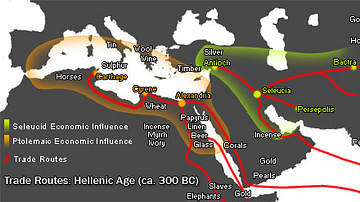Search
Search Results

Collection
The History of The East India Company
The British East India Company (EIC) was founded as a trading company in 1600. Run by a board of directors in London, the company employed a private army, first to protect the trade it conducted in the Indian subcontinent and then to expand...

Article
Opening the Way to India
Possibly being overjoyed by the tales of mythical exploits of Heracles, Semiramis, the fabled queen of Assyria, Cyrus, King of Persia and so on, Alexander the Great set out from the tiny kingdom of Macedon for a daring adventure, unheard...

Definition
British Industrial Revolution
The British Industrial Revolution (1760-1840) brought innovative mechanisation and deep social change. The process saw the invention of steam-powered machines, which were used in factories in ever-growing urban centres. Agriculture remained...

Video
The Private Army of the British East India Company
Before the days of the Raj, British India was ruled by a private corporation: The Honourable East India Company. The Company, which began in India as a purely mercantile institution, eventually came to control vast territories across the...

Article
The Textile Industry in the British Industrial Revolution
During the Industrial Revolution (1760-1840), textile production was transformed from a cottage industry to a highly mechanised one where workers were present only to make sure the carding, spinning, and weaving machines never stopped. Driven...

Article
The Coronation Ceremony of the British Monarchy
The coronation ceremony of the British monarchy as we know it today involves many elements that have been a part of the pageantry ever since the 11th century. Such features of the ceremony carried out in Westminster Abbey since 1066 have...

Article
The Steam Engine in the British Industrial Revolution
Steam power was one of the most significant developments of the Industrial Revolution (1760-1840) in Britain. First invented as a pump in the 1690s, a host of inventors tweaked designs and tinkered with machinery until an efficient and powerful...

Article
Agriculture in the British Industrial Revolution
Agriculture, like most other areas of working life, was greatly affected by the machines invented during the Industrial Revolution. Agriculture in Britain and elsewhere had made leaps forward in the 18th century, and its success released...

Article
The Steel Industry in the British Industrial Revolution
The production of steel during the British Industrial Revolution became cheaper and more reliable thanks to the Bessemer converter, a type of blast furnace that removed undesirable impurities from pig iron. The superior strength and durability...

Article
Social Change in the British Industrial Revolution
The British Industrial Revolution (1760-1840) witnessed a great number of technical innovations, such as steam-powered machines, which resulted in new working practices, which in turn brought many social changes. More women and children worked...